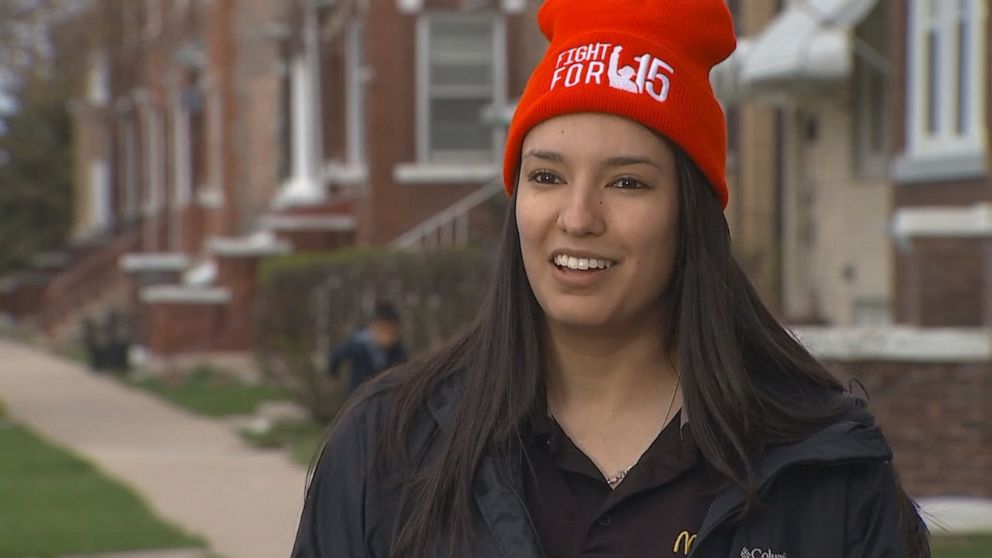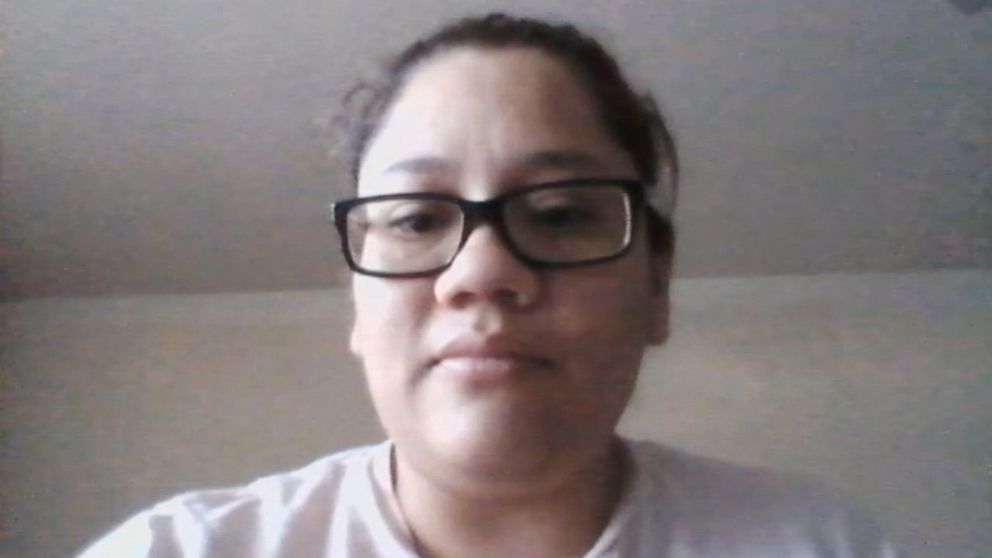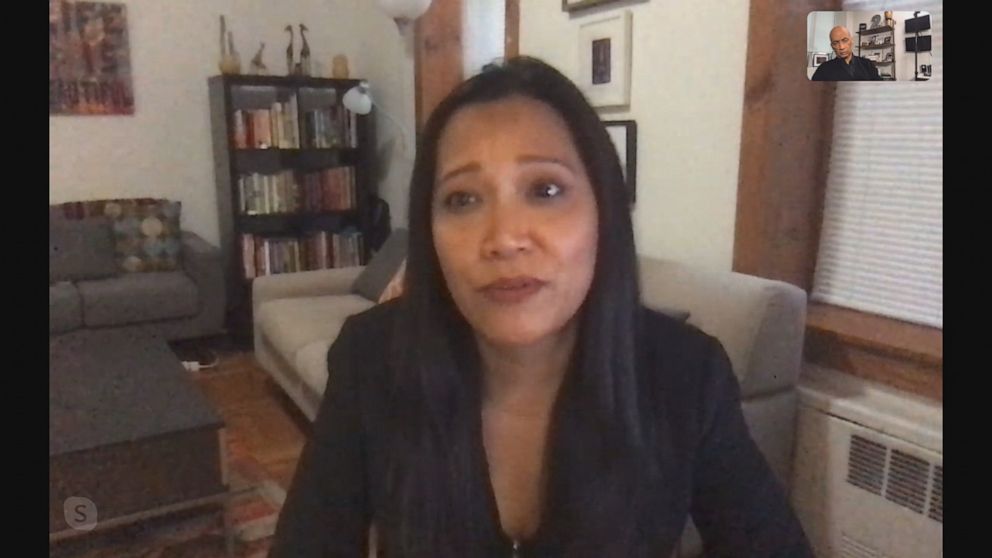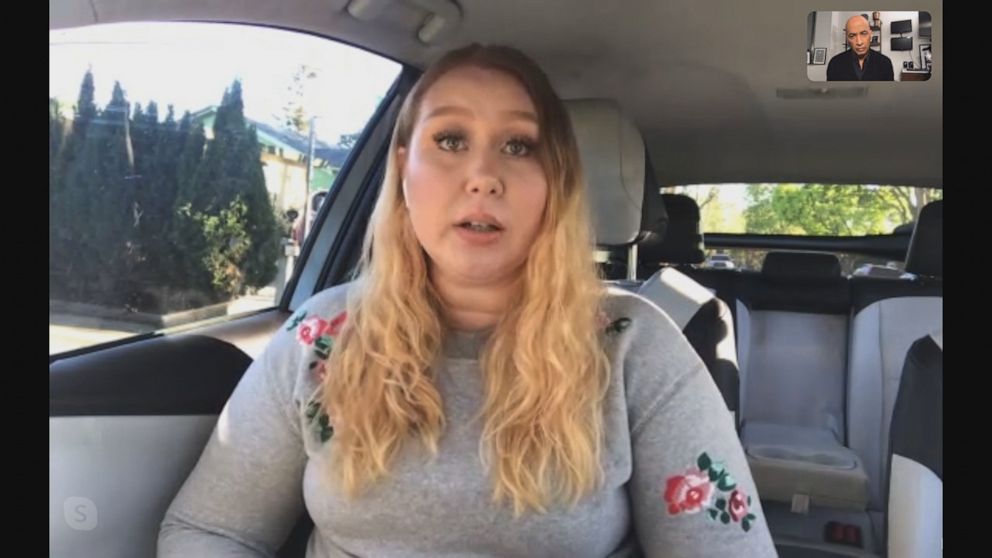'Underlying crisis': Foodservice workers protest lack of COVID-19 safety measures, hazard pay
Adriana Alvarez has worked at a McDonald’s outside of Chicago for nearly 10 years. But she said the job that has been her lifetime is now potentially life-threatening because of the novel coronavirus crisis.
The 27-year-old single mother, who has an 8-year-old son, said she makes an hourly wage of $13.45, which is barely enough to support her family. She is among millions of essential workers who are on the frontlines of the pandemic helping to feed people throughout the United States by staffing fast-food counters, drive-thru windows and fulfilling online grocery orders.
“Now, we’re categorized as essential workers. Before, we were just burger flippers who should get a better job, go to college,” Alvarez told “Nightline.” “But now we’re the ones out there risking and keeping this economy flowing. So I feel like we’ve been very important. It’s just people fail to realize it.”
Unable to work from home, Alvarez is among other foodservice employees who have become front line workers. Some say they are doing their jobs without the protections they need to keep themselves and their customers safe.
“We deserve hazard pay. We deserve paid sick leave," Alvarez said. "We’re risking going to work... and we’re still getting paid the same poverty wages and I don’t think that’s fair.”

Tune into ABC at 1 p.m. ET and ABC News Live at 4 p.m. ET every weekday for special coverage of the novel coronavirus with the full ABC News team, including the latest news, context and analysis.
Alvarez is part of the Fight for $15 movement, an effort that started out advocating to raise the federal minimum wage to $15 per hour. Since the COVID-19 pandemic, the group has also supported employee strikes around the country. On Wednesday, the group organized an online strike of McDonald’s employees, including Alvarez.
“This is life or death,” she said, mentioning a McDonald’s employee in California who’s fighting for her life on a ventilator due to COVID-19.
That employee is 56-year-old Sonia Hernandez. Her daughter, Jennifer Barrera Hernandez, described her as a “lovely, lovely mom” who “gave everything for us.” She said her mother was always there to provide for her family over the 18 years that she worked at a McDonald’s in Monterey Park, California.
Hernandez claims at that time her mother wasn’t provided with gloves or a mask to wear at work. She said Sonia began feeling ill in March but that she continued to work until her health took a turn for the worse in early April, when she tested positive for COVID-19.
"My cousin, she texted me that there were going to take my mom to a hospital," Jennifer Barrera Hernandez said. "My mom called us all, like my brothers and my sister and me, she called us saying that she was going to have to go a ventilator and they were going to put her under sedation."
That was the last call that Hernandez said she had with her mother, who is now in critical condition.

“She told me, ‘I want you guys to take care and I want you to take care of the kids,’” Hernandez said. “That was before she was put on the machine. [She said], 'Take care of everyone.'”
"We have to make a decision, if ever her heart stops, if we want them to resuscitate her or just let her leave in peace," she added.
Hernandez’s family has since set up a fundraising page to help raise money for her medical bills.
Last week, an employee from the McDonald’s where Sonia Hernandez worked filed a complaint with the state’s Division of Occupational Safety and Health, asking in part that "the company instruct all the workers who were exposed, either directly or indirectly [to the sick employee] … to self-quarantine, with full pay for the time of self-quarantine.”
In a statement, McDonald’s said that when it was notified of the employee's diagnosis, it “immediately reached out to four other crew members that had come into close contact with the employee, instructing them to self-quarantine for 14 days,” and that the restaurant was also “closed overnight for routine deep cleaning," conducted in accordance with the latest CDC guidelines." They also said that starting with measures taken in March, the Monterey Park restaurant crew was equipped with PPE including gloves, masks, and protective barriers, and continues to abide by social distancing guidelines to safely serve customers.
“Since February, we have changed nearly 50 processes in McDonald’s U.S. restaurants, such as adding employee wellness and temperature checks,” McDonald’s continued, adding that it is “confident McDonald’s employees impacted by the virus are receiving paid sick leave to tend to their critical health needs” and that their "number one priority is the health and well-being of our people, who are the heart and soul of McDonald's."
The company said it was “also exploring other potential benefits like ‘hero’ pay bonuses.”
"I would say, just fight for your rights," Jennifer Barrera Hernandez said. "Today, is my mom. Tomorrow, I don't know, it could be theirs, or it could be them."
"If you feel like you're doing the appropriate measures to keep us safe, then come on down and work with us," Alvarez said. "Come on down so they can see exactly what we have to go through and how anxious we feel just to be at work, and if we're not at work, we can't feed our kids. We can't feed our families. We can't feed ourselves."
Allynn Umel, the organizing director for Fight for $15, says she hopes the people she represents “get the respect and the dignity that they have deserved and have been fighting for” once the COVID-19 pandemic is over.
“McDonald’s workers and others have historically been treated as disposable … and McDonald’s workers in this moment have claimed their space,” she added.

It's not just fast food workers who are raising their voices. Gig workers across the country have claimed to feel unsafe on the job as well. Vanessa Bain was working as an Instacart shopper, picking up and delivering groceries to online customers in Silicon Valley, California, until March 13, when she walked out in protest over what she says were unsafe working conditions.
"Coronavirus, that's not the crisis," Bain said. "The underlying crisis is that there is more work than ever. It's precarious. People don't have savings accounts. People are not in a position where they're earning income that is in surplus to their expenses."
Other Instacart shoppers, like Bain, have walked out of their jobs as well.
“We turned off the app,” said Sharon Maze-Goen, a 57-year-old Instacart shopper. “We asked for the [personal protective equipment], which, you know, that was the last thing they gave in to. But then again … they didn’t make them readily available.”
Instacart said in a statement that over the past few weeks, the company had “consistently, proactively communicated with the shopper community to ensure they had the support they needed,” adding that they "absolutely respect the rights of shoppers to provide [them] feedback." The company said it had also “secured health and safety kits that will include a face mask, hand sanitizer and a thermometer to distribute to shoppers across the community.”

In an effort to provide relief to essential workers, ranging from doctors and nurses to delivery drivers and janitorial staff, Massachusetts Sen. Elizabeth Warren and California Rep. Ro Khanna proposed an Essential Workers Bill of Rights earlier this week that they hope will be included in the next federal coronavirus relief package. The policies within include providing health and safety protections, higher compensation and universal paid sick leave.
"We have to go on strike because they don't listen to us," Alvarez said. "So, the more people, the more power we have."
What to know about coronavirus:
- How it started and how to protect yourself: Coronavirus explained
- What to do if you have symptoms: Coronavirus symptoms
- Tracking the spread in the U.S. and worldwide: Coronavirus map



